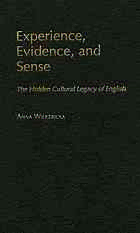Table Of ContentExperience, Evidence,
and Sense
This page intentionally left blank
Experience,
Evidence, and
Sense
The Hidden Cultural Legacy of English
A W
NNA IERZBICKA
1
2010
3
OxfordUniversityPress,Inc.,publishesworksthatfurther
OxfordUniversity’sobjectiveofexcellence
inresearch,scholarship,andeducation.
Oxford NewYork
Auckland CapeTown DaresSalaam HongKong Karachi
KualaLumpur Madrid Melbourne MexicoCity Nairobi
NewDelhi Shanghai Taipei Toronto
Withofficesin
Argentina Austria Brazil Chile CzechRepublic France Greece
Guatemala Hungary Italy Japan Poland Portugal Singapore
SouthKorea Switzerland Thailand Turkey Ukraine Vietnam
Copyright#2010byOxfordUniversityPress,Inc.
PublishedbyOxfordUniversityPress,Inc.
198MadisonAvenue,NewYork,NewYork10016
www.oup.com
OxfordisaregisteredtrademarkofOxfordUniversityPress
Allrightsreserved.Nopartofthispublicationmaybereproduced,
storedinaretrievalsystem,ortransmitted,inanyformorbyanymeans,
electronic,mechanical,photocopying,recording,orotherwise,
withoutthepriorpermissionofOxfordUniversityPress.
LibraryofCongressCataloging-in-PublicationData
Wierzbicka,Anna.
Experience,evidence,andsense:thehiddenculturallegacy
ofEnglish/AnnaWierzbicka.
p.cm.
Includesbibliographicalreferencesandindex.
ISBN978-0-19-536800-0;978-0-19-536801-7(pbk.)
1.Englishlanguage—Semantics. 2.Englishlanguage—Socialaspects.
3.Languageandlanguages—Philosophy. I.Title.
PE1585.W542009
420.1043—dc22 2009000574
9 8 7 6 5 4 3 2 1
PrintedintheUnitedStatesofAmerica
onacid-freepaper
ACKNOWLEDGMENTS
First and foremost, I would like to express my gratitude to Cliff Goddard, who
read successive versions of all the chapters of this book and contributed enor-
mouslytotheanalysespresentedinit.
IwouldliketothanktheAustralianResearchCouncilforprovidingfundsfor
research assistance, without which I would not have been able to complete this
project.Ihavebeenblessedbyresearchassistantsofexceptionalcompetenceand
dedication;theycontributedvaluableideas(andsavedmefromnumerouserrors,
conceptualaswellaspractical).Iwanttoexpressmydeepandsincerethanksto
my long-term research assistants Helen Bromhead, Anna Gladkova, and Carol
Priestley.
I would also like to acknowledge the input of my ARC-funded research
associates, Mary Besemeres and Ian Langford. Mary’s expertise in English
literature, cross-cultural life-writing, and English studies has significantly en-
richedthisbook.Ian’sexpertiseinlawwasparticularlyrelevanttothechapters
onevidenceandcommonsense.
Iamindebtedtomanyothercolleagueswhowerewillingtodiscusswithme
the aspects of the book where their expertise was particularly relevant. In
particular, I have benefited from semantic discussions with Zhengdao Ye, Jock
Wong, and Kyung JooYoon, fromdiscussionabout French with James Grieve,
aboutGermanwithAndreaSchalleyandGabySchmidt,aboutItalianwithBrigid
Maher;aboutRussianwithAnnaGladkova;andaboutphilosophicalmatterswith
ThomasMautner,JimFranklin,andDougPorpora.
IamgratefultomysemanticsstudentsattheAustralianNationalUniversity
for their valuable input. My advanced Seminar on Semantics was an unfailing
vi ACKNOWLEDGMENTS
sourceofinspiration andenjoymentaswellasatestingground formanyofthe
analysesdevelopedinthisbook.
I would like to thank my editor at Oxford University Press, Peter Ohlin,
whosesuggestions,advice,andsupportwereashelpfulthistimeaswithprevious
projects.
Over the years I have been greatly helped by discussions with family
members. My daughters, Mary Besemeres (who has already been mentioned as
my ARC-funded research associate) and Clare Besemeres Brooker, spent
hundredsofhoursdiscussingwithme,andarguingabout,themeaningofmany
quintessentially English words and phrases without equivalents in other lan-
guagesandofAnglovaluesandassumptionsassociatedwiththem.Myhusband,
John Besemeres, has for some decades done a great deal to edit much of my
published work and suggested rephrasings aimed at making my English prose
sound a little less Polish and more “Anglo” (“reasonable” and “dispassionate”)
thanitotherwisemighthavebeen,andhedidsoonthisoccasionagain.
Earlier versions of two chapters of the book were published as journal
articles:“MoralSense,”(JournalofSocial,Evolutionary&CulturalPsychology,
1(3),66–85),and“ExploringEnglishphraseologywithtwotools:NSMsemantic
methodology and Google,” (Journal of English Linguistics, 37(2):101–129). A
section of the chapter on “Experience” was published as “‘Experience’ in John
Searle’s Account of the Mind: Brain, Mind, and Anglo Culture,” (Intercultural
Pragmatics,3–3(2006)241–255).
CONTENTS
Part I. Introduction
1. MakingtheFamiliarLookForeign,3
1. MereWordsorKeystoaCulturalWorld?3
2. TheCulturalandHistoricalBaggageofEnglish,4
3. TheLegacyof“BritishEmpiricism,”6
4. TheEnglishWordEmpiricalandtheFrenchWordEmpirique:
ACloserLook,11
5. ‘Theory’,‘CommonSense’,andtheReliabilityoftheSenses,13
6. NaturalSemanticMetalanguageasanEffectiveMethodologyforCultural
Semantics,16
Part II. Experience and Evidence
2. Experience:AnEnglishKeywordandaKeyCulturalTheme,25
1. TheUniquenessoftheEnglishConceptof‘Experience’,25
2. ExperienceastheMotherofWisdom:Shakespeare’sSapientialPerspective,34
3. “AFrighteningExperience”:FromaRetrospectivetoan
IntrospectivePerspective,38
4. SensoryExperienceasaBasisforEmpiricalKnowledge:
ALockeanPerspective,44
viii CONTENTS
5. TheVerbtoExperience:EvidencefortheSemanticShift,54
6. ExperiencesinAnglophonePhilosophy:JohnSearle’sPerspective,58
7. ExperienceinReligion:WilliamJames’sPerspective,65
8. “BearingWitness”:SharedExperienceinAnglophone
ArtandHistory,74
9. IKnowfromExperience...,78
10. EnglishExperienceComparedwithGermanErfahrung
andErlebnis,83
11. ConcludingRemarks:TheHistoryofIdeasand
theMeaningofWords,90
3. Evidence:Words,Ideas,andCulturalPractices,94
1. EvidenceasaKeyCulturalConceptinModernEnglish,94
2. AnOutlineoftheSemanticHistoryofEvidence,100
3. LinguisticEvidence,119
4. TheNewDiscourseofEvidence,122
5. SourcesoftheModernConceptsofEvidenceinLaw,Theology,Philosophy,and
Science,131
6. ConcludingRemarks:Semantics,Culture,andSociety,144
Part III. Sense
4. TheDiscourseofSenseandtheLegacyof“BritishEmpiricism,”151
1. Sense,Senses,andModernEnglishSpeechways,151
2. TheFiveSenses,155
3. TheVerbtoSense,159
4. ASenseofWhatIsHappening,162
5. ToHaveaSenseThat...,169
6. ThereIsaSenseThat...,176
7. GiveUsaSenseof...,178
5. ASenseofHumor,aSenseofSelf,andSimilarExpressions,184
1. ASenseofHumor,184
2. ASenseofSelf,192
3. ASenseofFreedom(Confidence,Achievement,Competence),198
4. ASenseofObligation(Duty,Responsibility,Urgency),202
5. ASenseofHistory,aSenseofTimeandPlace,
aSenseofReality,204
6. ASenseofJoy,209
6. AStrongSense,aDeepSense,andSimilarExpressions,212
1. AStrongSense(ofSomething),212
2. ADeepSense(ofSomething),231
CONTENTS ix
3. ASharpSense(ofSomething),242
4. AGoodSense(ofSomething),250
5. AGreatSense(ofSomething),262
6. ARealSense(ofSomething),269
7. AFalseSense(ofSomething),277
8. AKeenSense(ofSomething),279
9. AClearSense(ofSomething),292
10. AnAcuteSense(ofSomething),302
7. MoralSense,313
1. MoralSense:AHumanUniversaloranArtifactofEnglish?313
2. ABriefHistoryoftheConceptof“MoralSense,”317
3. MoralSenseintheEighteenthCenturyandNow:AComparison,322
4. ASenseofRightandWronginPresent-DayEnglish,324
5. Conclusion,326
8. CommonSense,328
1. TheImportanceofCommonSenseinAngloCulture,328
2. CommonSenseinLaw,333
3. TheUniquenessofEnglishCommonSense
(CommonSensevs.BonSens),337
4. TheMeaningofCommonSenseinContemporaryEnglish,346
5. ThomasReidandtheOriginofEnglishCommonSense,354
6. CommonSenseandtheBritishEnlightenment,359
9. FromHavingSensetoMakingSense,368
1. BeingSensible,368
2. HavingSense,372
3. MakingSense,377
Part IV. Phraseology, Semantics, and Corpus Linguistics
10. InvestigatingEnglishPhraseologywithTwoTools:NSMandGoogle,395
1. AnOverview,395
2. ClearandStableContrasts,396
3. StableandOverwhelminglySharpContrasts,397
4. Figures,Proportions,andPatterns,398
5. Anomalies:HowSignificantAreThey?400
6. MonitoringtheProportionsofStrongSensetoDeepSense,402
7. LimitationsofGoogleasaToolforExploring
EnglishPhraseology,403
8. ComparingtheResultsofGoogleandYahooSearches,404
9. ConcludingRemarks,405

